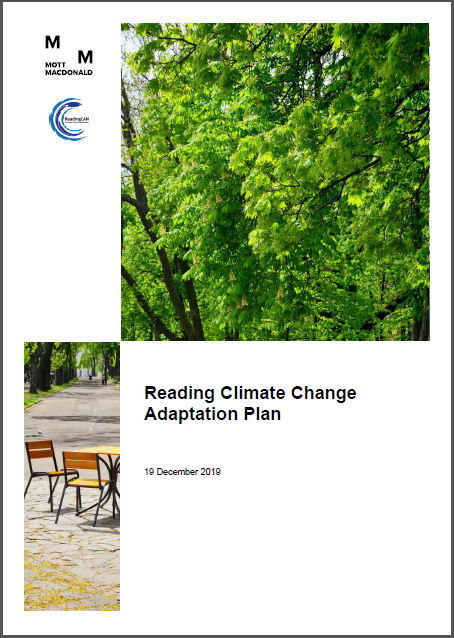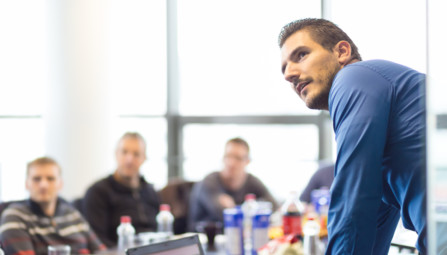Download Reading Adaptation Plan Final
Some of these adaptation ideas have already been picked up in the development of our New Strategy. We will learn more though over the next few years, as we get better prepared for the future.
October 2019 pre-launch event
The Reading Climate Change Partnership has commissioned a first Adaptation Plan for Reading. This will help us to understand some of the climate-related risks that we face in our town. It will also give us some guidance about how we should respond to prepare for these changes.
On the 22 October 2019 we held an event at the Town Hall, to give an introduction to the plan. This was followed by a good opportunity for public questions and answers.
As Chair of the RCCP, I gave a introduction, highlighting the need to think about climate change adaptation, and why we commissioned this report.
- I talked about what is behind the Zero Carbon Reading 2030 target and how this fits with global carbon zero targets.
- We face a profound choice: if we can move away from coal, oil and gas, within the next decade, we have a good chance of limiting climate change to 2 degrees C. If we don’t, we face the risk of more extreme weather events.
- There is a growing public pressure for us to meet our low carbon targets but I finished by noting how the political and media focus is very much elsewhere.
- Hence we need to think about adaptation, and get ourselves ready for a hotter and stormier future.
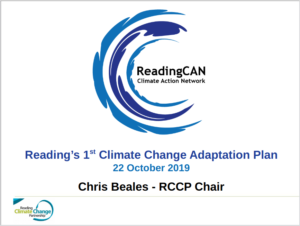
Please note that some images may be subject to copyright. Credit: Chris Beales, October 2019
Jason Lowe (Met Office [based at Reading University]) then talked about the impacts of climate change for the UK and Reading specifically.
- Jason started by noting some of the consequence of recent extreme weather events in the UK, including: the increase in hospital admissions resulting from the recent heat waves; and the damages associated with flooding.
- He showed some of the visible changes we have seen in Reading’s temperature and rainfall records.
- He then moved on to talk about the recent UK Climate Projections 2018 (UKCP18), which highlight a number of risks for the town including: hotter extreme temperatures; more rainfall in the winter season; potential for flash flooding.
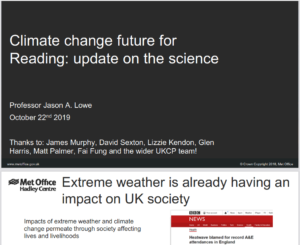
Please note that this presentation may be subject to copyright. Credit: Jason Lowe October 2019
Lisa Horrocks (Mott MacDonald) has been developing the Adaptation Plan. She talked about what is in there and some of the key lessons for us. The plan is divided into the following sections:
- Impacts by Sector – matching the 6 themes in our new Strategy, with the key risks and opportunities.
- Impacts by Place – focusing on 3 parts of the town: the town center, the riverside, and our residential (terrace) streets.
- A number of Case Studies – which look at the adaption thinking from: The Oracle, Berkshire NHS Trust and the University.
- And finally some advice for us on how to take adaptation planning forward: what to do right now; through to who should own this; and the next steps.
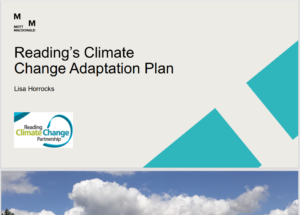
Please note that this presentation may be subject to copyright. Credit: Lisa Horrocks, October 2019
Finally I returned to give a short presentation on what is next:
- The following slide summarises my expectations from this first plan. It is important to note that it is a light touch first plan for the town. The emphasis is very much on learning about adaptation so we can get everybody on board.
- There are a lot of things that we need to pick up on from this first plan.
- We will need to start thinking about more detailed Adaptation Planning over the next couple of years.Whether this is to develop a single second plan or more targeted, sector-based plans. We will need to invest more money to make this happen. Hopefully we can build on some of the adaptive planning that has been pioneered by projects like Thames Estuary 2100.
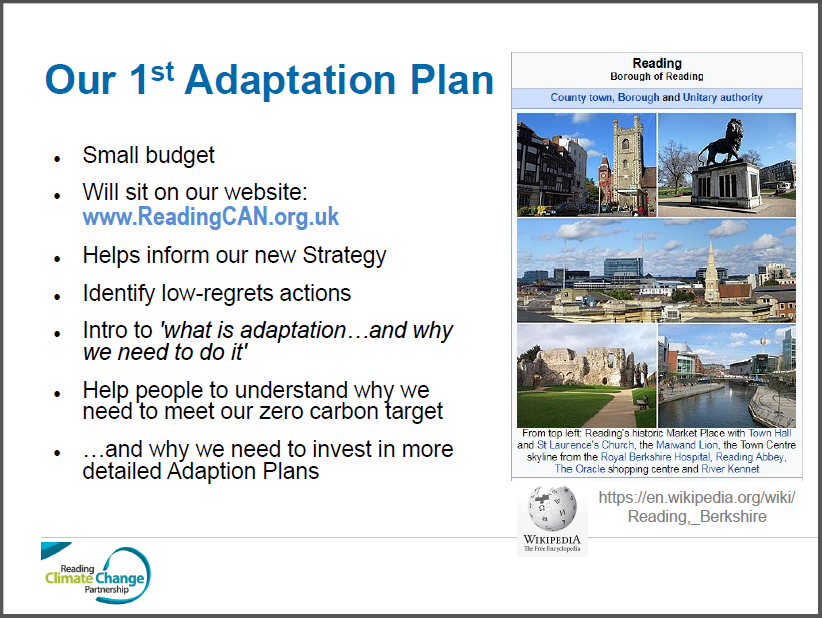
Chris Beales
November 2019

